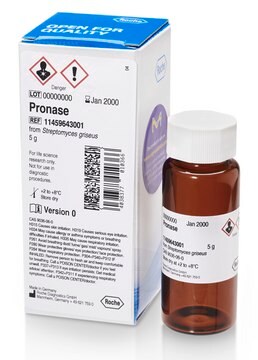L6132
L-Lysine–Agarose
lyophilized powder
Autenticatiper visualizzare i prezzi riservati alla tua organizzazione & contrattuali
About This Item
Prodotti consigliati
Stato
lyophilized powder
Livello qualitativo
Grado di funzionalizzazione
~4 μmol per mL
tecniche
affinity chromatography: suitable
Matrice
Sepharose 4B
Attivazione matrice
cyanogen bromide
Gruppi immobilizzati alla matrice
α-amino
Braccio spaziatore
1 atom
Compatibilità
suitable for chromatography
Temperatura di conservazione
2-8°C
Cerchi prodotti simili? Visita Guida al confronto tra prodotti
Applicazioni
L-lysine-agarose is used in protein chromatography, affinity chromatography and amino acid resins. L-lysine-agarose has been used to study mitogen-activated protein kinase (MAPK) cascades in abscisic acid (ABA) signal transduction pathways as well as to study the regulation of phosphorylation of tau protein in the brain.
Stato fisico
Lyophilized powder stabilized with lactose and dextran
Prodotti correlati
N° Catalogo
Descrizione
Determinazione del prezzo
Codice della classe di stoccaggio
11 - Combustible Solids
Classe di pericolosità dell'acqua (WGK)
WGK 3
Punto d’infiammabilità (°F)
Not applicable
Punto d’infiammabilità (°C)
Not applicable
Dispositivi di protezione individuale
Eyeshields, Gloves, type N95 (US)
Scegli una delle versioni più recenti:
Possiedi già questo prodotto?
I documenti relativi ai prodotti acquistati recentemente sono disponibili nell’Archivio dei documenti.
P Saxena et al.
Investigative ophthalmology & visual science, 41(6), 1473-1481 (2000-05-08)
With age, human lens crystallins become more pigmented, oxidized, modified by ascorbate oxidation and advanced glycation end products (AGEs), and bind copper. The hypothesis was tested that the major AGE and ascorbylation product in the human lens, N(epsilon)-carboxymethyl-L-lysine (CML), has
V J Christiansen et al.
Arteriosclerosis, thrombosis, and vascular biology, 17(1), 164-171 (1997-01-01)
Deposition of the terminal complement proteins (C5b-9) on human endothelial cells can result in cell lysis or nonlytic alterations of cell function including procoagulant responses. Because regulation of fibrinolysis is a central endothelial function and because C9 contains a carboxyl-terminal
M B Furie et al.
Journal of cell science, 88 ( Pt 2), 161-175 (1987-09-01)
Monolayers of bovine microvascular endothelial cells (BMECs) grown on connective tissue derived from human amniotic membrane were used to examine the transendothelial migration of human neutrophils in vitro. Neutrophils placed above these cultures migrated in response to a chemotactic gradient
H H Nguyen et al.
The Journal of biological chemistry, 273(14), 7957-7966 (1998-05-09)
The particulate methane monooxygenase (pMMO) is known to be very difficult to study mainly due to its unusual activity instability in vitro. By cultivating Methylococcus capsulatus (Bath) under methane stress conditions and high copper levels in the growth medium, membranes
J Tao et al.
Proceedings of the National Academy of Sciences of the United States of America, 89(7), 2723-2726 (1992-04-01)
A single arginine residue within the basic region of the human immunodeficiency virus Tat protein mediates specific binding of Tat peptides to a three-nucleotide bulge in TAR RNA. It has been proposed that arginine recognizes TAR by forming a network
Il team dei nostri ricercatori vanta grande esperienza in tutte le aree della ricerca quali Life Science, scienza dei materiali, sintesi chimica, cromatografia, discipline analitiche, ecc..
Contatta l'Assistenza Tecnica.






